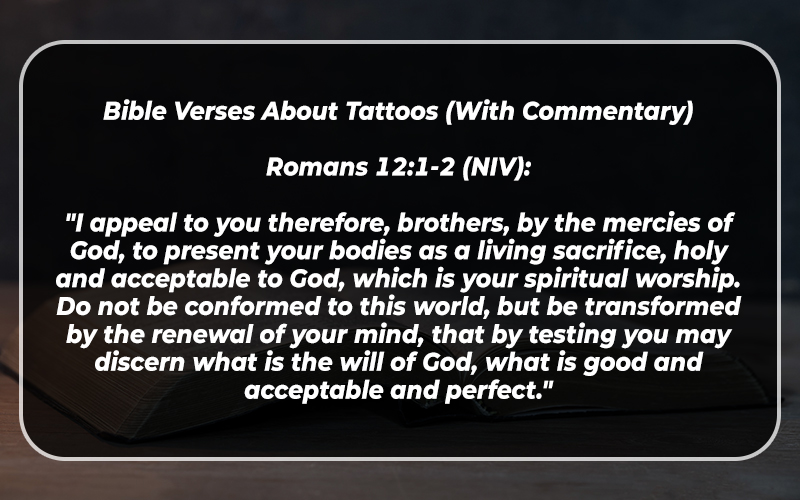Tattoos, the art of permanently marking the body with ink, have been a subject of varied perspectives throughout history. The Bible, a sacred text for many, does not explicitly address the topic of tattoos.
However, certain verses and principles can be explored to gain insights into how biblical principles may apply to the decision to get a tattoo. This compilation of Bible verses, along with extended explanations, seeks to provide guidance and reflection on the topic of tattoos from a biblical perspective.
Bible Verses About Tattoos
Leviticus 19:28:
“You shall not make any cuts on your body for the dead or tattoo yourselves: I am the Lord.”
This verse from Leviticus is often cited in discussions about tattoos. The prohibition against cutting or tattooing was part of the Old Testament law, with the intent of distinguishing God’s people from pagan practices.
1 Corinthians 6:19-20:
“Or do you not know that your body is a temple of the Holy Spirit within you, whom you have from God? You are not your own, for you were bought with a price. So glorify God in your body.”
Paul’s words to the Corinthians highlight the sanctity of the believer’s body as a dwelling place for the Holy Spirit. The decision to get a tattoo should consider how it aligns with the glorification of God in one’s body.
1 Corinthians 10:23:
“All things are lawful, but not all things are helpful. All things are lawful, but not all things build up.”
While acknowledging Christian freedom, Paul emphasizes the importance of considering whether a particular action is beneficial and constructive. Applying this to tattoos involves evaluating the motivation and impact of the decision.
Romans 14:23:
“But whoever has doubts is condemned if he eats, because the eating is not from faith. For whatever does not proceed from faith is sin.”
Paul underscores the significance of acting in faith and avoiding actions that are accompanied by doubt. For someone considering a tattoo, the decision should be made in a manner that aligns with personal faith and conviction.
1 Samuel 16:7:
“But the Lord said to Samuel, ‘Do not look on his appearance or on the height of his stature, because I have rejected him. For the Lord sees not as man sees: man looks on the outward appearance, but the Lord looks on the heart.'”
This verse from Samuel’s encounter with Jesse’s sons reminds believers that God’s focus is on the heart rather than external appearances. While considering a tattoo, individuals should reflect on the motivations and intentions of their hearts.
Galatians 5:1:
“For freedom Christ has set us free; stand firm therefore, and do not submit again to a yoke of slavery.”
The Christian has been set free by Christ, but this freedom comes with responsibility. When contemplating a tattoo, it is essential to discern whether the decision aligns with the freedom found in Christ.
Colossians 3:17:
“And whatever you do, in word or deed, do everything in the name of the Lord Jesus, giving thanks to God the Father through him.”
Paul’s exhortation emphasizes that all actions, including the decision to get a tattoo, should be done with the awareness of representing Christ and giving thanks to God.
Matthew 5:16:
“In the same way, let your light shine before others, so that they may see your good works and give glory to your Father who is in heaven.”
Jesus encourages believers to be a positive influence in the world. If considering a tattoo, it is crucial to evaluate whether it enhances or detracts from the ability to shine the light of Christ.
1 Corinthians 8:9:
“But take care that this right of yours does not somehow become a stumbling block to the weak.”
Acknowledging the freedom believers have, Paul urges caution to ensure that personal choices, including getting a tattoo, do not hinder the spiritual journey of others.
Romans 14:1-4:
“As for the one who is weak in faith, welcome him, but not to quarrel over opinions. One person believes he may eat anything, while the weak person eats only vegetables. Let not the one who eats despise the one who abstains, and let not the one who abstains pass judgment on the one who eats, for God has welcomed him.”
Paul addresses the diversity of beliefs among believers, emphasizing the need for mutual respect. When it comes to tattoos, understanding and respecting differing opinions within the Christian community is essential.
1 Corinthians 8:13:
“Therefore, if food makes my brother stumble, I will never eat meat, lest I make my brother stumble.”
Paul’s commitment to avoiding actions that could cause a fellow believer to stumble serves as a model for considering the impact of personal choices, such as getting a tattoo, on others.
James 4:17:
“So whoever knows the right thing to do and fails to do it, for him it is sin.”
This principle reminds believers that actions, including decisions about tattoos, should align with what they believe is right and true before God.
1 Corinthians 10:31:
“So, whether you eat or drink, or whatever you do, do all to the glory of God.”
The overarching principle for Christian conduct is to bring glory to God. When contemplating a tattoo, believers should assess whether the decision aligns with this central purpose.
1 Corinthians 6:12:
“‘All things are lawful for me,’ but not all things are helpful. ‘All things are lawful for me,’ but I will not be dominated by anything.”
While emphasizing the freedom believers have, Paul warns against being dominated or controlled by anything. When considering a tattoo, the potential impact on one’s life and priorities should be taken into account.
1 Corinthians 3:16-17:
“Do you not know that you are God’s temple and that God’s Spirit dwells in you? If anyone destroys God’s temple, God will destroy him. For God’s temple is holy, and you are that temple.”
Paul’s message to the Corinthians reinforces the sacred nature of the believer as God’s temple. The decision to get a tattoo should be made with a deep respect for the holiness of the body as God’s dwelling place.
Proverbs 3:5-6:
“Trust in the Lord with all your heart, and do not lean on your own understanding. In all your ways acknowledge him, and he will make straight your paths.”
Seeking God’s guidance and wisdom is crucial in decisions such as getting a tattoo. Trusting in the Lord and acknowledging Him in all aspects of life is foundational for making godly choices.
1 Corinthians 14:40:
“But all things should be done decently and in order.”
Paul’s instruction to the Corinthians underscores the importance of orderliness and decency in all actions, including the decision to get a tattoo.
Proverbs 16:2:
“All the ways of a man are pure in his own eyes, but the Lord weighs the spirit.”
This proverb serves as a reminder that individuals may perceive their actions differently than God does. Before getting a tattoo, one should consider whether the decision aligns with the Lord’s evaluation of the spirit.
1 Thessalonians 5:22:
“Abstain from every form of evil.”
While not explicitly addressing tattoos, this general principle encourages believers to steer clear of anything that may have negative or harmful implications.
1 Corinthians 11:14:
“Does not nature itself teach you that if a man wears long hair it is a disgrace for him.”
Paul’s reference to cultural norms serves as a reminder that societal expectations can influence perceptions. When considering a tattoo, awareness of cultural contexts and perceptions is important.
1 Corinthians 11:15:
“But if a woman has long hair, it is her glory? For her hair is given to her for a covering.”
Similar to the previous verse, this reference to cultural norms reinforces the idea that external appearances can carry symbolic meanings. Those considering tattoos should be mindful of the potential symbolic significance.
Romans 12:1-2:
“I appeal to you therefore, brothers, by the mercies of God, to present your bodies as a living sacrifice, holy and acceptable to God, which is your spiritual worship. Do not be conformed to this world, but be transformed by the renewal of your mind, that by testing you may discern what is the will of God, what is good and acceptable and perfect.”
Paul’s exhortation emphasizes the transformative renewal of the mind. When contemplating a tattoo, individuals should assess whether the decision aligns with the renewal of the mind and conformity to God’s will.

1 Corinthians 7:23:
“You were bought with a price; do not become slaves of men.”
This verse underscores the profound truth that believers belong to Christ. In the decision to get a tattoo, individuals should ensure that they are not driven by societal pressures or trends but are mindful of their identity in Christ.
1 Peter 3:3-4:
“Do not let your adorning be external—the braiding of hair and the putting on of gold jewelry, or the clothing you wear— but let your adorning be the hidden person of the heart with the imperishable beauty of a gentle and quiet spirit, which in God’s sight is very precious.”
Peter’s words emphasize the value of inner qualities over external adornments. When contemplating a tattoo, individuals should assess whether the decision aligns with the imperishable beauty of a gentle and quiet spirit.
2 Corinthians 6:14:
“Do not be unequally yoked with unbelievers. For what partnership has righteousness with lawlessness? Or what fellowship has light with darkness?”
While primarily addressing partnerships, this verse encourages believers to consider the associations and influences in their lives. When considering a tattoo, individuals should reflect on whether the decision aligns with their identity as followers of Christ.
Also Read: Bible Verses For The Heart (With Commentary)
What Are The Bible Verses About Sin (With Commentary)

